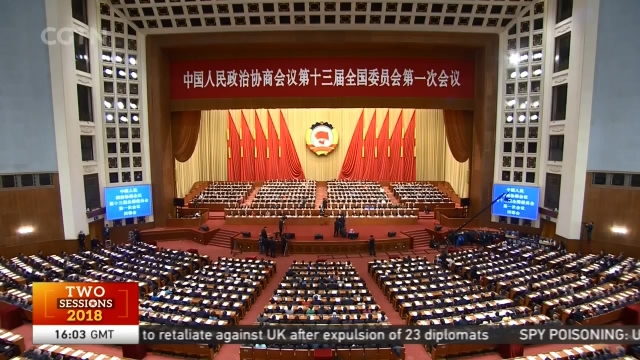
09:52, 16-Mar-2018
Today at the Two Sessions: 13th CPPCC National Committee concludes its first plenary session

Back here in Beijing and every evening during the ongoing Two Sessions -- China's annual political meetings -- we recap the most important developments of the day. Tonight we focus on the Chinese People's Political Consultative Conference, the country's top political advisory body, which concluded the first plenary session of the 13th CPPCC National Committee this morning.
The annual CPPCC session, which opened on Saturday, March 3rd, closed this morning at the Great Hall of the People.
Its two-thousand or so members approved a work report of the Standing Committee of the CPPCC National Committee as well as a resolution on an amendment to the advisory body's charter.
In his keynote speech, newly-elected Chairman Wang Yang said the CPPCC will strive to promote the benefits of socialism with Chinese characteristics.
WANG YANG CPPCC CHAIRMAN "The CPC leadership is the most defining character of socialism with Chinese characteristics and biggest political reality of China. Taking a clear stand in politics is the essential requirement of CPPCC. The CPC leadership is the fundamental political guarantee for the CPPCC to proceed and make progress. It is also the political principle that we have to adhere to."
Over the past two weeks, CPPCC members discussed a range of proposals on major issues in China today.
More than five thousand proposals were raised at this year's session -- covering such fields as economics, politics, culture, ecology and social affairs -- and about 80 percent of them were sent to their respective departments for implementation.
Ahead of the closing ceremony, some members of the CPPCC national committee took questions from the media.
LU CHUNFANG CPPCC MEMBER GENERAL DIRECTOR, BEIJING-SHANGHAI HIGH-SPEED RAILWAY "By 2025, China's high-speed rail length will reach 38,000 kilometers. And the trains will be safer and more comfortable."
YANG WEI CPPCC MEMBER ACADEMICIAN, CHINESE ACADEMY OF SCIENCES "We must increase investment in fundamental research, increase its percentage in research and development as a whole, from the current 5% to between 8% and 10%."
SU QUANKE CPPCC MEMBER CHIEF ENGINEER OF HZMB AUTHORITY "The core technologies and standards being used on the Hong Kong-Zhuhai-Macao Bridge could help Chinese enterprises 'go global' and advance the Belt & Road Initiative."

SITEMAP
Copyright © 2018 CGTN. Beijing ICP prepared NO.16065310-3
Copyright © 2018 CGTN. Beijing ICP prepared NO.16065310-3